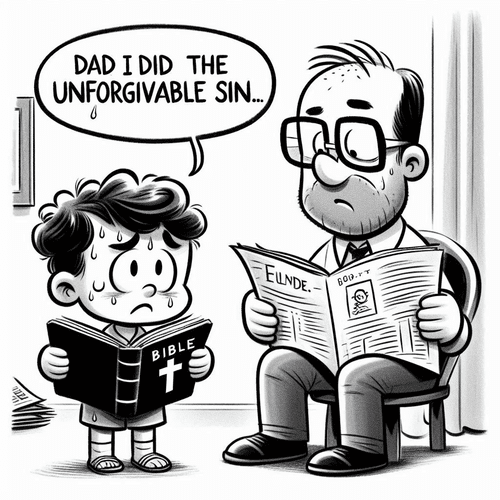The Unpardonable Sin: What is the Blasphemy Against the Spirit?
The unpardonable sin is the severe transgression Jesus warns us about in the gospels (Matthew 12:31-32; Mark 3: 28-29; and Luke 12:10—hover your cursor over the verses to read them). People refer to the sin also as the unforgivable sin, blasphemy against the Holy Spirit, the eternal sin, or even ‘the’ sin. Christians tend to hold one of four views on what this sin entails. Join us as we explore what these four perspectives are:
- Committing severe sins such as adultery, murder, or denying Christ under duress
- Asserting falsehoods about the Holy Spirit
- Attributing Spirit-empowered miracles to Satan
- Decisively rejecting clear truth revealed by the Spirit about Jesus by claiming His works are from Satan—this is the view held by most churches in the Reformed tradition.
Let’s consider each of these views by turn.
View 1: Committing Severe Sins such as Adultery, Murder, or Denying Christ Under Pressure
This view suggests extremely severe sins such as adultery, murder, or denying Christ under persecution are unforgivable. However, this view does not fit the context of Matthew 12, Mark 3, and Luke 12: and is clearly contradicted by the Bible: how can we be sure? King David committed both adultery and murder (2 Samuel 11–12; Psalm 51), Paul persecuted Christians (1 Timothy 1:13), and Peter denied Christ three times (John 18:15–18, 25–27; 21:15–19). Yet, all were forgiven. Genuine Christians continue to sin in various ways, but God forgives those who repent because of Jesus (1 John 2:1).
View 2: Asserting Falsehoods About the Spirit
Early church fathers including Cyril of Jerusalem, believed the unpardonable sin was asserting falsehoods about the Holy Spirit. However, this interpretation is too broad. Many non-Christians and Christians have held incorrect beliefs about the Spirit but later corrected them upon gaining better understanding.
View 3: Attributing Spirit-Empowered Miracles to Satan
This view, favoured by some dispensationalists, limits the unpardonable sin to attributing Jesus’ miracles to Satan. Some argue it could only be committed during Jesus’ ministry or the first century when miracles occurred. However, as DA Carson notes, miracles do not necessarily always indicate the Spirit’s presence and power (Matthew 7:21–23).
View 4: Decisively Rejecting Clear Spirit-Revealed Truth About Jesus by Attributing His Works to Satan
This perspective, held by the likes of John Calvin, suggests the unpardonable sin involves a conscious, deliberate rejection of clear spiritual truth about Jesus, particularly by attributing His miraculous works to demonic forces, rather than the Holy Spirit.
- It’s not an accidental or impulsive act, but a wilful repudiation of truth.
- Those who commit this sin resist God’s truth despite being aware of its validity.
- It involves a persistent, lifelong rejection of Jesus without repentance.
- God may respond by hardening the person’s heart, making repentance impossible.
- Only unbelievers can commit this sin.
This view distinguishes the unpardonable sin from apostasy, though there are similarities:
- Both involve resolute rejection of truth.
- Both result in a state beyond repentance.
- Scriptural passages about apostasy (Hebrews 6:4-6, 10:29; 1 John 5:16) do parallel aspects of the unpardonable sin.
Important considerations:
- It appears unlikely we may ever be able to definitively judge if someone has committed this sin while they’re alive. Only God can know for certain who has committed it.
- Those truly guilty of the sin are typically not concerned about it.
- Worry about having committed ‘the’ sin is thus often a sign one has not done so.
- Moreover, believers in Jesus can rest assured they shall not be condemned (Romans 8:1).
This view emphasises the gravity of repeatedly and knowingly rejecting clear spiritual truth about Jesus, while also offering reassurance to those who maintain faith or show concern for their spiritual state.
Conclusion
Some worry they may have committed the unpardonable sin. Those who are worried if they have, likely have not done so. How do we say so? Well, concern indicates a responsive heart. If you feel remorse for your sins and trust in Jesus, you have not committed the unpardonable sin. Instead of feeling condemned, continue to repent and trust in Jesus, for there is no condemnation for those in Him (Romans 8:1).
Related FAQs
- Can Christians commit the unpardonable sin? Most theologians assure us true believers in Christ cannot commit the unpardonable sin. If we have faith in Jesus and feel remorse for our sins, we have not committed this sin.
- How do I know if I’ve committed the unpardonable sin? If you’re worried about having committed the unpardonable sin, it’s a strong indication that you haven’t. Those who have committed this sin typically show no concern for their spiritual state.
- Is denying Christ under pressure considered the unpardonable sin? No, denying Christ under pressure is not considered the unpardonable sin. The Bible provides examples of forgiveness for such actions, like Peter’s denial of Jesus.
- Can the unpardonable sin be forgiven if someone repents? By definition, the unpardonable sin cannot be forgiven. However, if someone is able to repent and seek forgiveness, it’s a sign they have not committed this sin.
- Can we determine if someone has committed the unpardonable sin? Those who hold the fourth view suggest we cannot definitively judge if someone alive has committed this sin. Only God knows a person’s heart and ultimate spiritual state. Even after death, we can’t be certain, as a person’s final moments are known only to God.
Related Reads
Editor's Pick

Do Christians Need Holy Shrines? Why the Reformed Answer Is No
Walk into a medieval cathedral and you'll encounter ornate shrines, gilded reliquaries, and designated "holy places" where pilgrims gather to [...]

I Want To Believe, But Can’t: What Do I Do?
"I want to believe in God. I really do. But I just can't seem to make it happen. I've tried [...]

BC 1446 or 1250: When Did the Exodus Really Happen?
WHY REFORMED SCHOLARS SUPPORT THE EARLY DATE Many a critic makes the claim: “Archaeology has disproven the biblical account [...]

Does God Know the Future? All of It, Perfectly?
Think about this: our prayers tell on us. Every time we ask God for something, we’re confessing—often without realising it—what [...]

Can Christian Couples Choose Permanent Birth Control?
Consider Sarah, whose fourth pregnancy nearly killed her due to severe pre-eclampsia, leaving her hospitalised for months. Or David and [...]

Bone of My Bones: Why Eve Was Created From Adam’s Body
"This at last is bone of my bones and flesh of my flesh!" Adam's joyful exclamation upon first seeing Eve [...]

Is Calvinism Fatalism in Christian Disguise? Think Again
We hear the taunt every now and then: "Calvinism is just fatalism dressed up in Christian jargon." Critics argue Reformed [...]

Can Churches Conduct Same-Sex Weddings?
In an era of rapid cultural change, churches across America face mounting pressure to redefine their understanding of marriage. As [...]

Gender Reassignment: Can Christian Doctors Perform These Surgeries?
In the quiet of a clinic, a Christian physician faces a challenging ethical question. A patient sits across the desk, [...]

‘What Sorrow Awaits You Who Are Rich…’: What Does Jesus Mean?
The words hang in the air like a sword over comfortable Christianity: “What sorrow awaits you who are rich, for [...]
SUPPORT US:
Feel the Holy Spirit's gentle nudge to partner with us?
Donate Online:
Account Name: TRUTHS TO DIE FOR FOUNDATION
Account Number: 10243565459
Bank IFSC: IDFB0043391
Bank Name: IDFC FIRST BANK






